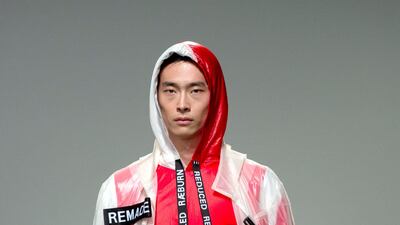Upcycling is the recycling of clothing and other items in such a way that the resulting product is of a higher value than the original items used to make it. Generally created from post-consumer waste, which is waste produced through the disposal of manufactured goods, the process of upcycling requires the re-contextualisation of the wasted materials as resource, rather than surplus.
The average American purchases more than five garments a month and discards about 30 kilograms of textiles a year. Between 50 and 75 per cent of textiles end up in landfills, despite the fact that these are almost completely recyclable. The average lifespan of a piece of clothing is generally considered to be around three years; with fast fashion, this is considerably less, meaning a significant percentage of waste sent to landfill is discarded clothing. Even if you donate your unwanted clothing to a charity shop, the chances are you are only delaying the inevitable. Less than 20 per cent of donated clothing is actually resold.
Clothes sent to landfill constitute a significant environmental problem. The wasteland takes up valuable space, and causes air, water and soil pollution, discharging carbon dioxide and methane into the atmosphere, and chemicals and pesticides into the earth and groundwater. The Organisation for Economic Co-operation and Development estimates that by 2020 we could be generating 45 per cent more waste than we did in 1995. It identifies recycling and reuse as one of the main waste-management principles, and has a long-term goal to avoid waste and use unavoidable waste as a resource wherever possible – the basic principle of upcycling.
There’s been a lot of focus on recycling of late, as China recently banned the import of trash from other countries. For decades, it has been the single largest importer of other people’s rubbish, which they sorted and recycled, but which was also the cause of major pollution. The ban forces countries that are used to exporting their waste to now deal with it locally.
There is a lot of work being done globally to draw attention to our problems with consumption and the rubbish it generates. One of the agencies drawing attention to garment waste in particular is Redress, an NGO from Hong Kong working to reduce textile waste in the fashion industry. Redress runs a number of programmes to highlight the negative impacts of fashion, with the intent of driving a more sustainable industry, and by working directly with designers, government and consumers.
The annual Redress Design Award is the world’s largest sustainable fashion design contest. The competition challenges participants to transform textile waste into stunning, scalable and commercially viable collections, and creates an international spotlight for designers working with upcycled materials.
There are, of course, some incredible designers working with upcycled materials that defy the fact that they work with unwanted fabric and garments. One of those brands is Bottletop, which produces a luxury collection of bags created in part from discarded aluminium ring pulls from soda cans. Based in the United Kingdom, the label works with disadvantaged communities in Africa and Brazil to create a sustainable livelihood for those who collect and wash the ring pulls, as well as for the highly skilled craftsmen that produce the bags.
In 2009, Yves Saint Laurent launched New Vintage, a capsule collection of limited-edition designs recycled from past collections and cut from leftover fabrics. It was an initiative of then creative director Stefano Pilati to combine sustainability with iconic YSL designs. The collection was sold through Barney’s New York and across YSL flagship stores worldwide. Sadly, the initiative only lasted a couple of seasons, and is now just a distant memory of a remarkable undertaking by a brand as influential as Yves Saint Laurent.
English designer Christopher Raeburn started his career working exclusively with recycled materials. Known for creating original outerwear from re-appropriated military textiles, the brand specialises in garments that are functional, intelligent and proudly remade in England. While the collection is no longer 100 per cent produced from recycled materials, they remain at the core of the brand ethos. The label is a pioneer in this space, and is known for working with such unexpected materials as military camouflage, army snow suits, air force flying suits and hot-air balloons.
Emi and Eve produce a collection of jewellery and purses made entirely from recycled bullet and bomb casings from Cambodia. The collection is the outcome of a trip to Cambodia, where founder Cassandra Postema met a family who recycled landmines and artillery shells to make jewellery. The brand supports female Cambodian bomb disposal officers known as The Landmine Girls, who serve a vital need. As a result of 30 years of war, there are an estimated five million unexploded landmines still in existence in Cambodia, which stop locals from farming land and feeding their families, and children from playing in the fields.
So, the next time you think of purchasing a new piece of clothing, you might want to consider something upcycled that keeps textiles out of landfills, while simultaneously satisfying your need for something new.
___________________
Read more from Sass Brown:
Countering consumption with a new-look approach
In the future will we all be wearing lab-grown leather and mushroom skin?
Is the fashion industry finally becoming more inclusive?
___________________

